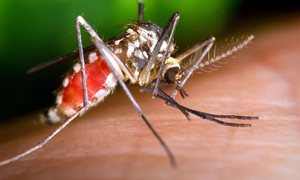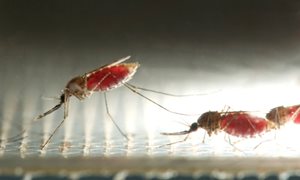
Radboudumc researchers Jeroen de Baaij and Felix Hol both receive an NWO Vidi grant for their research, respectively on magnesium deficiency in type 2 diabetes and on malaria.
The kidney in the picture: magnesium deficiencies due to genetic causes and diabetes - Jeroen de Baaij
Physiologist Jeroen de Baaij receives a Vidi grant with which he will investigate how it is possible that some ten to thirty percent of people with type 2 diabetes develop magnesium deficiencies. This shortage occurs because the kidneys do not absorb magnesium and it leaves the body through the urine. With this grant De Baaij wants to develop cells in the lab that allow him to map what goes wrong in the absorption of magnesium, after which he can test it via animal experiments. With this knowledge he can test medications in order to find a treatment for this large group of patients. He will receive a grant of 800,000 euros.
Do parasites make mosquitoes better at transmitting malaria? - Felix Hol
Biophysicist Felix Hol receives a VIDI grant for malaria research. Mosquitoes are extremely successful at making people sick by biting and infecting them with parasites. He wants to study how interactions between mosquito and parasite influence the spread of malaria. He does this by using a manufactured artificial skin. By releasing mosquitoes onto this skin, he wants to map out how the parasite influences the biting behavior of the mosquito. Do certain parasites make mosquitoes more hungry? Using film, he wants to map out how the mosquitoes can find people's blood vessels. Because the artificial skin is transparent, this process can be pictured exactly. Finally, he hopes to gain more knowledge about how the parasite, after the mosquito spits it out, moves through the skin into the human bloodstream. He is receiving a grant of 800,000 euros from the NWO.
About the grants
The Netherlands Organisation for Scientific Research (NWO) has awarded Vidi funding of 800,000 euros to 101 experienced researchers. This will enable them to develop their own innovative line of research and set up a research group over the next five years. Vidi is aimed at experienced researchers who have carried out successful research for a number of years after obtaining their PhD. Together with the Veni and Vici grants, Vidi is part of the NWO Talent Programme.
-
Want to know more about these subjects? Click on the buttons below for more news.
More information
Annemarie Eek

wetenschapsvoorlichter
Pauline Dekhuijzen

wetenschaps- en persvoorlichter
Related news items

Grants for heart and kidney research Two awards to Radboudumc in Open Competition ENW-XS
21 July 2022Two researchers from the Radboudumc receive a grant from the NWO within the Open Competition of the Exact and Natural Sciences. They are Thijs Eijsvogels, who studies the heart, and Pieter Leermakers, who studies the kidneys.
go to page
Field research on malaria vaccine offers unexpected surprise
23 May 2022Field research on the effectiveness of a malaria vaccine, came up with unexpected results for an international group of researchers including Benjamin Mordmüller of Radboudumc. The vaccine evokes a broader response against malaria proteins than there are in the vaccine.
go to page
Human pluripotent stem cell-derived kidney organoids for personalized congenital and idiopathic nephrotic syndrome modeling
11 May 2022 Bart Smeets, Jitske Jansen and collegues, theme Renal disorders published this article in the Human Development. go to page
Rubicon grants awarded to three RIMLS researchers
19 April 2022Three researchers have received Rubicon funding from NWO/ZonMw. This will enable Elke Muntjewerff, Laura de Vries and Laurens van de Wiel to do research at a foreign research institute for the next two years.
go to page

